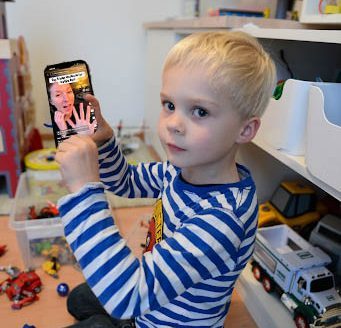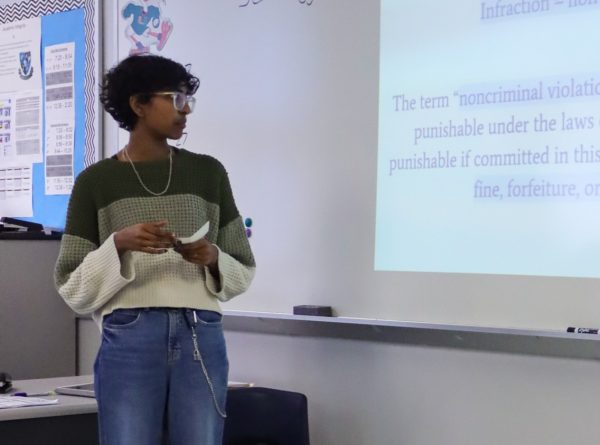Farah fights cancer
photo by Provided by Elham Farah
The most recent post from @marchformarwan , an Instagram account dedicated to his treatment and recovery. It was posted on April 18, a little over a week after his diagnosis.
In April, senior Marwan Farah’s mother discovered a few lumps on his neck, and she brought him to a doctor. She did not think much of it, though, because he had not been showing any unusual signs; he was active and in good shape.
He was sent to get blood drawn, and the doctor knew immediately that it was more serious. After being referred to the hospital on April 8, Farah was diagnosed with Acute Lymphoblastic Leukemia.
ALL is the most common childhood cancer, occurring when bone marrow cells develop errors in their DNA. There are about 200,000 cases per year in the U.S. alone. The five-year survival rate is about 70 percent, and most cases occur in people under the age of 15, or over 55.
“The diagnosis was the worst part,” Farah said. “All I remember is being really afraid.”
Senior Andrew Whisenant and Farah have been friends since first grade and hearing about the diagnosis, “was like a punch to the gut.” He went to visit Farah in the hospital two weeks after the diagnosis.
“He has an upbeat personality, even with everything he has gone through,” Whisenant said. “He is by far the strongest person I know.”
Early on, the most noticeable change was a loss of strength and energy, but then chemotherapy led to behavioral changes too, such as being very moody. It also took a toll on his body, causing him to lose a lot of weight, and then he lost his hair in June and again in October.
“He was so worried about what would happen to him,” Farah’s mother, Elham, said. “He was scared for how it was going to affect his future.”
Due to the diagnosis, doctors were worried about his immune system faltering, which could lead to infections. He stopped attending school right after the diagnosis and also had to stop playing soccer, a sport he has been playing since the sixth grade. He is enrolled in virtual school to keep up with his classes.
“I was absolutely floored about the news… to have such a major illness hit a young man just doesn’t seem fair,” head coach Michael McAvoy said. “He should be enjoying his senior year in school and on the field.”
The team was shocked to learn of Farah’s diagnosis and brainstormed ways they would be able to help out. Treatment – more specifically chemotherapy – has cost almost $2 million so far, and though insurance has covered most of it, the expenses have been substantial, so they decided to try and help with the cost. Sharon Chacon, a team mom, originally came up with the idea of selling t-shirts at the game to help raise awareness and funds. McAvoy offered for the players to wear the shirts during their “pre-game” routine. “Team Marwan” shirts are sold at every boys and girls soccer home game for $15, and supporters can also buy rubber band bracelets for $1.
They have sold over 100 shirts to date and will be on campus this Friday, Dec. 16 to sell them during lunch. They will also have the bracelets available, as well as orange leukemia awareness ribbons for a $1 donation.
“The team wanted to do something special, so we decided shirts would be the best thing,” senior and varsity soccer captain Josh Chacon said.
Farah’s first round of chemotherapy took place on April 12, and he is in his eighth month of treatment. He is currently on his last round of chemotherapy and after he is finished, he will be doing chemotherapy once a month for the next two and a half years. He is being treated at the Florida Hospital Orlando, but he is living at home, and since he is living at home, he has to monitor his health closely. For example, if he has a fever of 101 or higher, he needs to go to the hospital immediately because of the possibility of an infection.
Though his treatment has been going well, the long-term health effects are scary. They include the possibility of infertility, as well as heart and lung problems. After he is finished with his current chemo-therapy rounds, he will have to get his heart checked at the hospital every year for the rest of his life to avoid developing heart disease.
He will be returning to school in January for the second semester. However, because of long-term health risks, he will not be able to play soccer. While treatment has been rough, with Farah not being able to get out of bed for days at a time, he was helped through it by spending time with friends and family, and knowing the prognosis, though not guaranteed, is good.
“I have adapted to it, but I don’t really think about it too much,” Farah said.
Follow Marwan’s progress on the Instagram page dedicated to his treatment and recovery, @marchformarwan.
Your donation will support the student journalists of Hagerty High School. We are an ad-free publication, and your contribution helps us publish six issues of the BluePrint and cover our annual website hosting costs. Thank you so much!







